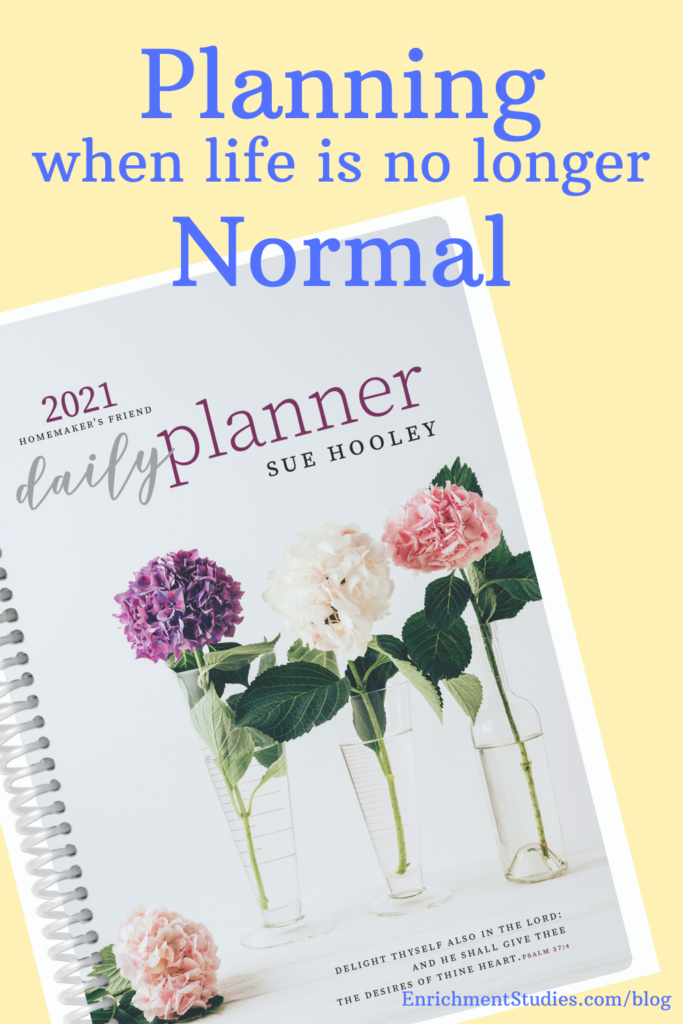This is a guest post by Sue Hooley. Sue is a longtime homeschooling mother of six and the creator of the Homemaker’s Friend Daily Planner. You can read my review and watch my show and tell video about this planner here.
 I remember the morning when I opened my planner, and nothing written applied to where I lived nor what I should do next. I was a displaced missionary and my days did not have the typical demands. For a while, the unexpected vacation was delightful, but before long I felt lost in nothingness.
I remember the morning when I opened my planner, and nothing written applied to where I lived nor what I should do next. I was a displaced missionary and my days did not have the typical demands. For a while, the unexpected vacation was delightful, but before long I felt lost in nothingness.
Universally, we experienced rearranged schedules in 2020. In a way, women received the brunt of the chaos. Without warning, we became homeschooling moms who prepared huge amounts of food, day after week after month. As a bonus all the coffee shops were closed, and other rejuvenating pleasures disappeared.
Homemakers are a flexible bunch that learn to roll with the surprises. We erase, reschedule and juggle duties on a regular basis. It is not unusual to start the day with “Plan A,” and shift to “Plan B” to deal with interruptions.
But what about limbo? That uncertain period of awaiting a decision or resolution? The time when you cannot plan for next week or next month? My brain tends to run in circles, and it is hard to focus. It seems impossible to plan anything when schedules are demolished. Meanwhile, my planner silently reminds me of predictable days gone by.
A planner primarily helps to organize days and duties. But a planner is equally helpful when days and duties cannot be organized. It may help you stay motivated and replace the emptiness with purpose. Your planner entries become a peculiar mix of “to do,” “maybe” and “did.” Small, attainable goals will help you be productive. There is not a quick fix to abnormal times, but here are a few tools to get you going.
Schedule an out. Limbo can be mentally overwhelming and sometimes clouds of depression hover. Schedule something refreshing. Write “Thirty-minute break,” (or longer). I needed this when I was homeschooling, and other adult family members were in and out of the house. After thirty minutes of quietness, my brain was clearer. Maintaining sanity is important. Find time to do what refreshes you.
Keep track of the days. Scribble daily notes on the now unscheduled planner slots. Record the weather, news tidbits, current events, with whom you talked, etc. Tracking your days will give you a historical record of what happened during unusual times. It is amusing to read old planner notes during limbo. Did I really need to write “wash my hair?”
Swap disappointment for creativity. It is hard to erase anticipated events, but you can use the tasks list to write creative replacements. One friend wrote me, “It was sad our Canadian relatives couldn’t come to the family reunion, but we made the best of it. Every day we wrote an email and sent pictures to those missing, including some quotes and funny quips.”
Write down what must be done. During disruptive times, laundry and food preparation can be a comforting routine or a bothersome obstacle. If I write those duties in my planner, it helps clear the brain fog in those areas. Plus, I am doing something that is routine. I fill my planner with little things that can so easily be forgotten. Buy stamps. Ask when meeting starts. Pay Mary $20.00. Do not forget to schedule fun. Go for family hikes or buy a new flavor of ice cream.
Try something new. It is good to have something to aim for. In the middle of shutdown, I learned how to make artisan bread. One of my friends learned how to design a photo book online. It is easy to let days slip by and all we do is wish for normal life. Limbo can bring unexpected gifts of time and pleasure. Text photos or inspiration to friends, get physical exercise, trade audio books with others, read the Little House Series to your children or have an indoor or outdoor picnic.
Remember you are not a superwoman. Abnormal living can affect our energy levels. Somedays you will be physically and mentally weary. Typically, we arrange duties in a way that makes sense for our household. Abnormality replaces sense with disorder. Give yourself time to work through new issues. Take note of what is causing the most brain drain and find ways to minimize the pressure. Sometimes a talk with a friend gives encouragement, a new perspective, and fresh ideas.
If we mindfully plan our day, we benefit ourselves and our family. We can productively use our time for what is most important regardless of our circumstances.





















